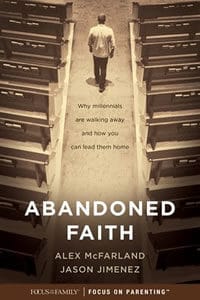Opening:
Teaser:
Jason Jimenez: So we’re trying to tell parents take responsibility. Don’t take ownership of everything; it’s impossible. We have free will; our kids have free will; and the older they get, they’re not always going to take your advice; but they are going to look at your example, and that’s where we have to show repentance.
End of Teaser
John Fuller: A good, but difficult challenge for parents of young adults or Millennials who may be wandering away from their faith. You’ll hear a lot more about that on today’s “Focus on the Family.” Your host is Focus president and author, Jim Daly and I’m John Fuller.
Jim Daly: John we had a great conversation last time about some of the common problems we parents face today with our young adult and even teenager children and I want to continue that discussion today. We’re talking about their book, Abandoned Faith. This is Alex McFarland, Jason Jimenez. They have done a terrific job kind of quantifying for us where young people are today and why many are walking away from the faith.
But don’t despair as a parent. There is good news. Many come back. And how do we set the groundwork in our relationship for that opportunity to draw our kids back into a relationship? And we’re gonna continue the discussion. If you missed it last time, get a download, get the CD, go to your Smartphone, download the Focus on the Family app, and John, you can tell us how to do that.
John: Well, I won’t go through all the steps right now, but the starting point is going to be http://focusonthefamily.com/radio. And Alex McFarland is a religion and culture expert. He’s a writer and speaker, a radio host. Jason is a former pastor who writes and speaks on apologetics. And as you said, Jim, their book, Abandoned Faith, is terrific. We’ve got that at the website. Or call us. Our number is 800-A-FAMILY.
Body:
Jim: Welcome back to the program, guys.
Jason: Thanks for having us.
Alex McFarland: Thank you.
Jim: It was energetic last time. I think there’s a lot of energy in this topic of our kids and where they’re headed, especially teens and early 20-something’s, and I think most people are leaning in, saying, “That’s right where we’re living.” And I would encourage you to get a copy of the book, because it’s packed with great content.
We left off, Jason, last time with you mentioning fear- versus faith-oriented parenting. I mean that’s a banner statement, as far as I’m concerned. So many of us in the parenting role, we are parenting from a fearful position. In fact, one of the adjectives to describe that is the “helicopter parent,” I mean the overprotective parent.
Jason: Right, yeah.
Jim: What is the impact on that teenager or 20-something of an overprotective parent? What does that child look like?
Jason: Yeah, in today’s world, in psychology they refer to it as the “enabler,” the enabling parent, as well, where they just keep doing things for the kid and the kid never learns for themselves.
A lot of it’s done because we look around. I mean when you look at some of the studies today and you look at older people, today they are fearful of cyber terrorism; they’re fearful of ISIS. They’re fearful of the economy falling apart. Is dad gonna have a job? Are we gonna be able to keep the mortgage? You know a lot of the household incomes have multiple cars. There are kids in college’ they’re paying for that, etc., and they’ve got a beach house or whatever, and so there’s a lot of worry there, as well.
And here’s the interesting thing: the Bible tells us, particularly Jesus, not to worry about tomorrow, not to be anxious. The Bible says not to fret, not to look at these things, not to be fearful, but to be courageous. And yet, the one thing that we are to lead and be the best example in, in parenting, is the one thing where we tend to have the most fear, and letting our kids go, as we talked about Jim and John, in our last episode, I believe, and one thing that Alex and I talk about in the book, where this comes from is there is an issue that this parent has with God.
Jason: Fear parenting takes things to heart and gets defensive. And because you have a lot of inadequacies and you feel already insufficient and you have issues maybe in your marriage, ’cause parenting is only as good as the marriage, oftentimes, you can take that out on the kids. But what we say is in Proverbs 17, a faith-based parenting is saying, you know what? When you overlook and offense, the Bible says, you seek love. But when you do the matter again, you separate from that close friend.
A lot of times, parents dig themselves further in the hole because they get defensive rather than look past the offense. And we have to say you’re the parent in this situation, even if you’re dealing with an adult child, you’re supposed to be the more mature one oftentimes, right?
Alex: You know what, Jason, if your child runs off the rail, you know the parent can take it really personally because—and I don’t mean to beat up on the parents here—we get our identity from the success of our kids. Now the Bible says our life is hid with Christ in God, and I believe, hey, we need to win with our family and we need to invest in our family; it is the priority, of course.
But that’s not our identity. Win or lose, our identity is in Christ, and oftentimes moms and dads kind of freak out if their kids are having a spiritual crisis because it cuts to the core of how they value themselves. And we need to realize that our value, our worth, our dignity is tied to Jesus, and that can never be taken away.
Jim: Why do you think, in our culture today, I mean arguably we’re as, if not more than, affluent than any other generation, and we have access to cheap goods and most people don’t go without their needs being met, and many people have their wants met. So you look at the affluence in the culture in that regard, and then you have incredible anxiety, as you mentioned, Jason, in terms of the culture, the teen climate particularly. They seem worried about so much at a young age, the anxiety, depression, and the simple fact that teen suicides are at their highest rates within the affluent cultures of this world.
Alex: No. 1 cause of death of those under 30 is suicide.
Jim: What is going on? When you would think rationally this should be a time when there is general comfort and embrace, yet there’s all this mayhem going on emotionally? What’s happening?
Alex: We really are blessed, and you know, as a culture and as individuals God has given us, like you say, all of our needs and many of our wants. But even as believers it’s easy to lapse into materialism.
And we sometimes raise kids who there’s more about our stuff, the bling of life, than character. And I’ve come in the last few years to really pray, frankly, to pray about character and to really realize how much God places an emphasis on that.
Now you know what’s really cool is, like Francis Schaeffer years ago, he and his wife, Edith Schaeffer—great Christian leaders–talked about the home being a laboratory where God would build little saints. And the family is the church in miniature, they said. And I agree. And oftentimes the way we react if our children are having a faith crisis, that can say as much to the child about our trust and our depth with the Lord as if we, you know, brandish some Josh McDowell argument or something. And I believe in apologetics.
But the fact that we can calmly, with utter confidence in God, process this ’cause, you know, family is a journey. The journey of a disciple is often messy, you know. It’s not just this clean, you know, press a button, automatic spirituality. And the way a mom and dad is able to trust Jesus through the storms of family life, that says as much about the authenticity of the gospel as some data that we throw on the table.
Jason: Yeah, and the other thing, too I’d say, Jim and John, in this situation with this anxiety, this stress issue, is younger people have taken a lot for granted. Give you an example. Recently I was with a good friend of mine who is the parent of many Millennials; they even went off to Liberty, wealthy family, very affluent. I mean I live in Charlotte; it’s a banking town and there’s a lot of big mega churches with a lot of wealth. I was on staff at many of those churches. And it’s, to some degree, it’s kind of disgusting, right, ’cause you just have everything and all your wants are there and satisfied. It’s like Disney World. You know, it’s fun while you’re there kind of thing, but the faith oftentimes, the discipleship is very shallow.
Now what you find with a lot of these kids is they are just handed everything, and they’re not really content. They don’t have a spirit of being content, and the Scriptures over and over again talk about how we need to be content.
Jim: Why?
Jason: Well, one of the things is these people that, when you talk about a lot of the Millennials, they take things for granted, and so they are always wanting something else. It’s always searching for something more than what they have.
So there’s a lack of contentment, and they become discontent because they’re not satisfied because they’re always searching for something else when, in fact, they need to be searching for the relationship with Christ.
Jim: Well, that’s the question why we as parents, and particularly Christian parents, why do we shy away from allow them to struggle?
Jason: Right.
Jim: ‘Cause we know scripturally there’s something good that comes from struggling.
Alex: “It is good for a young man to bear the yoke in his youth.”
Jim: Right, that’s the proverb of it.
Alex: Yeah, it builds our character.
Jim: But why do we not, we could read it, Alex, but why do we not embrace it?
Alex: You know, our culture defines love oftentimes as material giving, you know. I’m gonna show that I love you by buying you something like that. You know it’s interesting. Of all the kids we interviewed, I asked, “What do you remember most about growing up?” Or “What is a cherished memory?” And it’s always something about time and relationship. I don’t know that I ever interviewed a teenager who said, “Oh, you know I got this Xbox and boy, that did it for me.” Or, you know, it’s not about money and it’s about—I know this is going to sound like a cliché perhaps, but T-I-M-E. It’s about time.
Jim, I’ve heard you talk about solutions we can share around the dinner table, but let me just encourage everybody listening to have that family meal time together. Sociologists talk about the meal time is one of the best vehicles for the passing on of values and imparting values. And I know we’re busy; we’re wired up, we’ve got stuff to do, but I would encourage people if you don’t have the dinner table together, try; pray about it.
Try to have family meal time as many nights a week as you can. And I mean an unplugged meal time, you know, where we really get into each other’s heart and souls and that koinonia, that fellowship within the home, because that is where the faith that goes the distance is very often passed on is around the breaking of bread.
Jim: And we’ve really talked about the family dynamic, and hopefully people are picking up that sense of what we need to do as family, as you said, eat meals together. Even last night, what’s so amazing is when you train that muscle memory, if I can call it that, we were all busy yesterday afternoon, and you know, we ended up eating in different places, but we were together about 6:30 last night and we sat around the table. We didn’t have food in front of us, but we sat around the table for about an hour.
Alex: Just together.
Jim: It was almost like a faux meal, you know. We normally do that, but the fact that we were on the go, but we still ended up just spontaneously, nobody said, “Let’s all sit at the table now.” It just happened. And I think it’s because that’s normally what we would do. But that should be the fiber of the family where you’re having that kind of dialogue. And again, it doesn’t happen all the time, but boy, if you can seek to arrange that in any gentle way you can, I think it’s a good thing.
Jason, you talked about the church, and I want to come back to that. Now in your answer, if you could define for us Boomers again. I’m struggling to keep it all straight between Millennial—
Jason: Boomers, Plurals.
Jim: –Plurals. I mean my boys were born in 2000 and then 2002, so I don’t even know.
Alex: They would be Plurals.
Jim: Okay, they’re Plurals.
Alex: Because they’ve never known an America that wasn’t pluralistic, very hyper pluralistic.
Jim: Correct, so that’s the Plurals concept.
Jason: Yeah.
Jim: But we talked about why the families are losing their children to the faith, but why are churches losing Millennials particularly?
Jason: Here’s the problem: A lot of the church have not looked at Millennials and say, “Well, they’re not paying the bills to keep us open.” That’s’ reality. I’m saying that because I’ve been in those meetings of big mega churches that rake in millions of dollars that come in. I’ve led these departments and put staff together to try to reach the Millennial generation, so I understand there’s a lot of the Evangelical church saying they’re not bringing in the money, so why do we need to focus in on them rather than say they’re the next generation and we need to make disciples?
So we really need to say enough of that. We need to reach them and we’ve lost track of that. The other thing is when they do try to appeal to Millennials, they’re trying to appeal to them with the skinny jeans and the hat and the loud music with all the steam and music and the 22 little, you know, sales pitch of the Bible with one or two verses, you know, on the stage, and it’s just an experience that they’re trying to give them. Millennials don’t want that.
John: Yeah.
Jason: And here’s a reality: a lot of the ones that grew up in the church, when you talk about the ones who abandon the faith later on in life, they had a lot of doubts early on and did not feel safe expressing those doubts within the church.
We talked to a lot of people that have been in the posts that we’ve been in the church. We did not create a safe haven for them. We built programs, you know, we filled the calendar. We have moms and dads going off over there down the hall, children’s ministry’s rocking it out, you know, with Disney characters and the youth are just there with their pizza and their Pepsi, you know, and just doing their thing, and we’re all separated.
And the reality is we were not addressing, biblically speaking, theologically speaking, where they were as they were developing. And when they did have doubts, most of them will tell you, they were looked at as a skeptic if they spoke out and they said they even questioned the Bible. God forbid. And they flipped out.
Alex: Or they say, “You’ve just got to have faith.”
Jason: So the reality is that was done, but what we’re seeing—here’s the good news—what we’re seeing is there is a change.
Jim: Hm.
Jason: The churches are getting back to the Word of God with this younger generation, and they’re making it more of a priority and saying, “Help us invest in them and help us address some of these questions and doubts and concerns that they have,” and we’re seeing amazing things take place.
Jim: No, and those are all good things. So we’ve talked about the family and perhaps the breakdown there and what’s happening spiritually. We’ve talked about the church and some of the shortcomings and the way that’s turning around.
Jason: It’s turning around.
Jim: That’s excellent. Speak directly to the Millennials, you know, that’s where the issue is. What would you say to them about embracing responsibility and helping them to emerge as adults maybe a little earlier than it’s currently happening in late 20’s, maybe 18, 19?
Jason: Yeah, well, the message I have, I think that’s powerful, the message we have to the Millennial is that we can’t fix you; we’re not here to change you; we’re not here to try to manipulate or try to coerce you to do something. We believe in you as a generation. You’re the largest generation, but yet you are the most godless generation.
A lot of people look down on this generation, and the sad reality is a lot of people have even taken advantage of the Millennial generation, and it’s caused them to go further in debt. Marketers love the Millennial generation because they are quick buyers, right? They’re not loyal to a certain product, but they’re gonna want something when they see it if they can afford it. But the reality is they really can’t. But marketers have appealed to this Millennial generation. I think that has been sad because it’s taken the focus off the potential of this Millennial generation.
Jason: Millennials, you guys are diverse, you’re passionate, you care about a cause greater than yourself, and so, we pray, our heart and desire is that you will engage and open the Word of God. If you’ve had a relationship with Christ in the past but you’ve walked away with that, God is still right there with you, and He’s ready and willing to forgive you of your sins, and God has a plan and a purpose for your life to also reach your generation for Christ.
John: How can somebody in their 20’s, say, who grew up in a Christian home and knows all those Bible stories, how can they re-engage with Scripture? What’s something practical they can do to get something fresh that they may have kind of left behind for a long, long time?
Alex: That’s a great question, and you know, one of the things that we talk about in the book is that they want instruction. The three things that a 20-something wants, if they do feel inclined to go to church, and to church leaders, listen up to this, I’m gonna give you No. 1 and No. 3: caring and authentic. But No. 2 is instructive. No. 1, if a young person is gonna go to church, they want to know that they matter, that they are cared about.
No. 3, they want leaders and presenters that are themselves genuine and authentic. But No. 2, instruction. We’ve done survey after survey; they are saying, “Teach me something. We want to learn.”
If there’s a core value that we want to put forth to this and really every generation is what we would call biblical authority. You know Christ is the Living Word. Scripture is the written Word. And the Bible really is our roadmap for life. You know, we’ve talked a lot about Proverbs. I do a lot of commencements, and they ask me to speak at a high school commencement, and I always share Proverbs 3:5 and 6.
Jim: Yeah, my favorite.
Alex: Oh yeah. This is our mission for life: “Trust in the Lord with all your heart. Do not lean on your own understanding. But in all, not some but in all your ways acknowledge Him, and He will direct our path.” So what we can say is, look, God does have a plan for you. God will be with you. And if you’ll plant your flag with the Lord Jesus, He will guide you through life. And that’s a message that kids are hungry to hear.
I’ve got to tell a story though. To the distraught parent who might be worried about, you know, that their child has jettisoned the faith, I got a call from a mom and a dad, very upset. Their son was going to engineering school. He’s sitting under all these PhDs. He’s become a skeptic. “Can he come and see you?” Absolutely.
So he had just bought a motorcycle, and he rides his motorcycle to my house, which was cool, and I’m talkin’ about motorcycles, ’cause I like motorcycles, too. And he’s an atheist now. So we had this very, very nice talk for really about two hours, and in my heart I kind of thought, you know I’m not getting much of anywhere.
So he left. I live in North Carolina, and he’s gonna ride on the Blue Ridge Parkway on his bike. So he left and I wished him well. I said, “May I pray for you?” And I said a prayer. Anyway, about three years later he calls me up and he asks how he can get some of my books. And I remember our conversation, which I thought was pretty, you know, futile, and I said, “Now what are you doing?” “Well, I got a job with a geology firm. I’m in Texas and I teach the college class.”
I’m like what? “I thought you were an atheist.” He said, “Well, do you remember when I left your house to go ride my motorcycle in the mountains?” And I said, “Yeah. ” He said, “Well, I ran out of gas, and I get in a downpour of rain,” and he said, “for an hour I’m walking in a downpour of rain, I leave my bike, and I’m thinking about all the stuff you said. Finally, a pickup truck pulls over to give me a ride, I hop in, and the guy, all the way to the gas station, witnesses to me about Jesus Christ.” And he said, “I thought, you know God’s trying to get my attention.”
Now my point in sharing all that is mom and dad, don’t underestimate how God will work through circumstances to pierce through the veneer and the layers of skepticism. It’s a multi-leveled response. We pray, we love, and our kids and those in our life need to know, look, I love you, period. You’re a believer, you’re a skeptic, doesn’t matter. I’m going to invest in you with no expectation of return.
Now do we want them to come back to Christ? Of course, but they need to know that we love them unconditionally whether they ever do or not. And we pray and we wait, and while we’re asking God to work in the life of our child, God’s working in our life to teach us to trust Him as He works through the circumstances.
Jim: Jason, in fact you have a story about your parents praying for you. Were you that prodigal, or how far off the rail did you go?
Jason: No actually, yeah, I appreciate your bringing that up, because it was kind of an emotional time to really try and connect with parents who we’ve been talking about on the show with you guys who have a lot of regrets and saying, “Well, how do I reconnect? It’s awkward. It’s scary.” One of the things we said, just start praying.
And that story, Jim, that was when I lost my mother. My mom was killed in a car accident, and I started to have a lot of fear of death, and when you’re missing your mom and you’re having dreams and nightmares about her. And she was killed in a car accident, and I remember I started to have some like some demonic activity, some things were really happening, and I was very troubled by it.
And my dad had introduced me to some prayer warriors in our local church years prior, and I remember just praying a little bit, and I told my brother one time, and I was crying about it, missing my mom, and so he went and told my dad and I didn’t even know about it at the time. Well, that whole entire night my dad stood, you know, or knelt down at the foot of the staircase to my room and was making intercession over me, praying over me.
And I remember how compelling and real that was. It was like in the spiritual realm of this back and forth of this darkness and it’s really satanic but then just this light. And here my father was standing in the gap and he was interceding for his son.
And so, that next morning I remember saying, “Hey Dad, by chance were you in my room or whatever?” And he says, “No, I was praying for you. Joe, your brother, had told me what you were going through. Why didn’t you come tell me?” I said, “Dad, you know, I don’t know, whatever,” and he says, “Well, I’ve been praying for you, and I will continue to pray for you.” And that actually started to build a relationship between my dad and me where we started praying more often together, and because he was standing in the gap and he was introducing me to people within our church who were praying over me. And that’s, I will tell you Jim and John, that’s when I really started getting into intercessor prayer, because my dad was interceding for me.
So the power of a parent’s prayer and we have a chapter toward the end of the book called “The Prayer Map.” It’s a way for parents to be guided in how they can pray over their children. And we will say this, as Alex said earlier, and again the whole book, Abandoned Faith, is about hope and healing. If we want to reach this generation with hope and healing, the parents need to receive it first and foremost. If we want to try to fix them, right, we need to be fixed in our own heart, let God do the work.
But the prayer map is key. A lot of parents come up to us after conferences and say, “I don’t have a relationship,” or something. I just got an e-mail from a family who said, “We received an e-mail from our [son]. He’s in this late 20s, our son who’s married with kids and just sent an e-mail and said, ‘I don’t want to have anything to do with you guys right now. I’m going through a lot of stuff,’” and he’s blaming them. Some things have resurfaced.
And they’re looking at me, and I’m like, “I don’t know what to say to you, but what we can do—and this is what we should be doing from start to finish—is praying.” So some of these parents don’t have communication with their son or their daughter, but you know what? You can be interceding for them and the Holy Spirit will be communicating with your son or your daughter.
There’s not a hard heart out there that God cannot break, if these people are willing and ready. And that’s what we’re seeing, you guys. We’re here to tell your listeners, God is moving on this Millennial generation. God is saving a lot of them and we’re seeing a lot of ’em are coming back, so to your point, John, a lot of them are even downloading the You Version, the Apple, excuse me, the Bible app, and they’re reading it and they’re commenting on it and they’re putting things together and they’re building communities on their own, outside of even the local church.
And they are talking about the Bible. We’re seeing this happen. And a lot of them are going back to their moms and dads and they’re wanting to have spiritual dialogue with them that they’ve never had before, so there is hope. So we are not to give up.
Jim: Well, and what I appreciate you saying there is that do the right thing as a parent. You don’t own the outcome.
Jason: You don’t.
Alex: That’s true.
Jim: The Lord owns it, but it’s still right to do the right thing, even if in the short run you’re not seeing the right thing in return from your children.
Alex: It’s an opportunity. The Christian life, fundamentally, is about trust. We trust Jesus as our Savior, we trust Him for our future, and let me say this to the moms and dads. If we can trust Jesus with our soul, we can trust Him with our children.
Jim: Hm, it’s hard, and I want to admit that, but it’s the right thing to do. Man, we are out of time, but this has been so good. I mean I’m all energized. You can probably hear it through the microphones just what it means to me to address this issue. I want to put something on our website that’s from your book, “Parenting Advice from 1 Thessalonians,” which I think is terrific. These are a handful of bullet points, maybe 8 or 9. “Don’t let your parenting be deceptive. Be faithful in your stewardship as a parent. Be sincere in your commitment. Don’t choose money or fame over family.” Wow.
“Be humble.” We talked about that. “Be gentle and patient and understanding. Be affectionate and willing to make sacrifices for your family. Work hard and don’t be a burden. Be blameless in your family.” Hm, there’s a tough one. Lastly, “Be consistent in encouraging, comforting, and exhorting your Millennial to live worthy of God, not for yourself.”
Those are great points. We’ll post those with your permission. This book, Abandoned Faith, a great resource to help you in your parenting journey, whether it’s with 5-, 6-, 7-year-olds, or 15-, 16-, 17-year-olds, or 25-, 26-, or 27-year-olds. The point is, your job’s not over. God’s not done. Don’t look at the short view; look at the long view, and pray. What a great resource. Thanks for being with us.
Jason: Thank you, guys.
Alex: Thank you.
Jason: We love you guys.
Alex: It’s a great honor to be here.
Closing:
John: And we do hope you’re gonna follow up by getting a copy of that book by Alex and Jason, along with a CD or a download of our two-day conversation. The starting point is 800, the letter A and the word FAMILY; 800-232-6459 or www.focusonthefamily.com/radio.
And if you’ve been listening to “Focus on the Family” for a while or perhaps you’re a new listener, we want to be your go-to resource center for all your parenting needs. That’s why we’re here to serve families like yours with programs like this one, with our websites, our counselors, our resources, so much. And no doubt, you’ve benefitted from this broadcast today or maybe you’ve contacted us in the past for a resource. If that’s the case, let me encourage you to help pay that forward. Make a generous donation to this ministry today to help other moms and dads through their time of need.
Support Focus with your prayers and financial gifts so more families can benefit from the great advice and encouragement that we offer day in and day out. Donate online at www.focusonthefamily.com/radio or when you call 800, the letter A and the word FAMILY. And when you do, request your complimentary copy of the book, Abandoned Faith. It’s our thank-you gift for joining our support team.
I wish you a great weekend with your family and your church community and I’ll invite you to join us again on Monday. We’ll have Liz Curtis Higgs here to bring the story of Easter alive for us.
Excerpt:
Mrs. Liz Curtis Higgs: If you’re gonna go through the passion of Christ, there’s going to be a lot of sorrow, a lot of suffering, a lot of pain, more than I could ever have imagined in my own personal life, as well as in the story of the Christ. But oh, does it make the end even more glorious.
End of Excerpt
John: I’m John Fuller and on behalf of Focus president, Jim Daly and the entire team, thanks for listening and we’ll see you again next time, as we once again, help you and your family thrive.


















